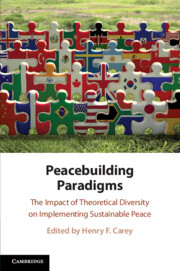Book contents
- Peacebuilding Paradigms
- Peacebuilding Paradigms
- Copyright page
- Contents
- Figures
- Tables
- Contributors
- Foreword
- Introduction Bridging the Conceptual and Theoretical Divides on Peace and Peacebuilding
- Part I The Realist Paradigm
- Part II The Liberal Paradigm
- Part III The Constructivist Paradigm
- Part IV The Cosmopolitan Paradigm
- Part V The Critical Theory Paradigm
- Part VI The Locality Paradigm
- Part VII The Policy Paradigm
- 17 Peacebuilding Paradigm from the Perspective of Policy Approach
- 18 A Bottom-Up View at Peacebuilding
- Conclusion A Hybrid Approach to Understanding Peacebuilding
- Bibliography
- Index
Conclusion - A Hybrid Approach to Understanding Peacebuilding
from Part VII - The Policy Paradigm
Published online by Cambridge University Press: 16 December 2020
- Peacebuilding Paradigms
- Peacebuilding Paradigms
- Copyright page
- Contents
- Figures
- Tables
- Contributors
- Foreword
- Introduction Bridging the Conceptual and Theoretical Divides on Peace and Peacebuilding
- Part I The Realist Paradigm
- Part II The Liberal Paradigm
- Part III The Constructivist Paradigm
- Part IV The Cosmopolitan Paradigm
- Part V The Critical Theory Paradigm
- Part VI The Locality Paradigm
- Part VII The Policy Paradigm
- 17 Peacebuilding Paradigm from the Perspective of Policy Approach
- 18 A Bottom-Up View at Peacebuilding
- Conclusion A Hybrid Approach to Understanding Peacebuilding
- Bibliography
- Index
Summary
In this chapter we evaluate not only how different paradigms approach the topic of peacebuilding but also how they compare and contrast with one another. This essay suggests that despite some clear incompatibilities, realism, liberalism, constructivism, cosmopolitanism, critical theory, public policy, and localism share some common ideas about how to pragmatically resolve conflicts, including focusing on the participants of these conflicts, developing locally grounded solutions, maintaining long-term commitments, and focusing on comprehensive approaches to peace. The main divide, we suggest, is between understandings of power in practice, with the more monist approaches positing that local actions come from structures that are not easily perceived. This critique, however, is minimized by the reality that all of the paradigms agree that peace cannot be sustained without both tempering the prerogatives of power with ideas of equality and consulting local actors. We conclude this chapter with comments about the benefits a cross-paradigmatic approach to peacebuilding has from methodological and theoretical standpoints.
Keywords
- Type
- Chapter
- Information
- Peacebuilding ParadigmsThe Impact of Theoretical Diversity on Implementing Sustainable Peace, pp. 324 - 346Publisher: Cambridge University PressPrint publication year: 2020

